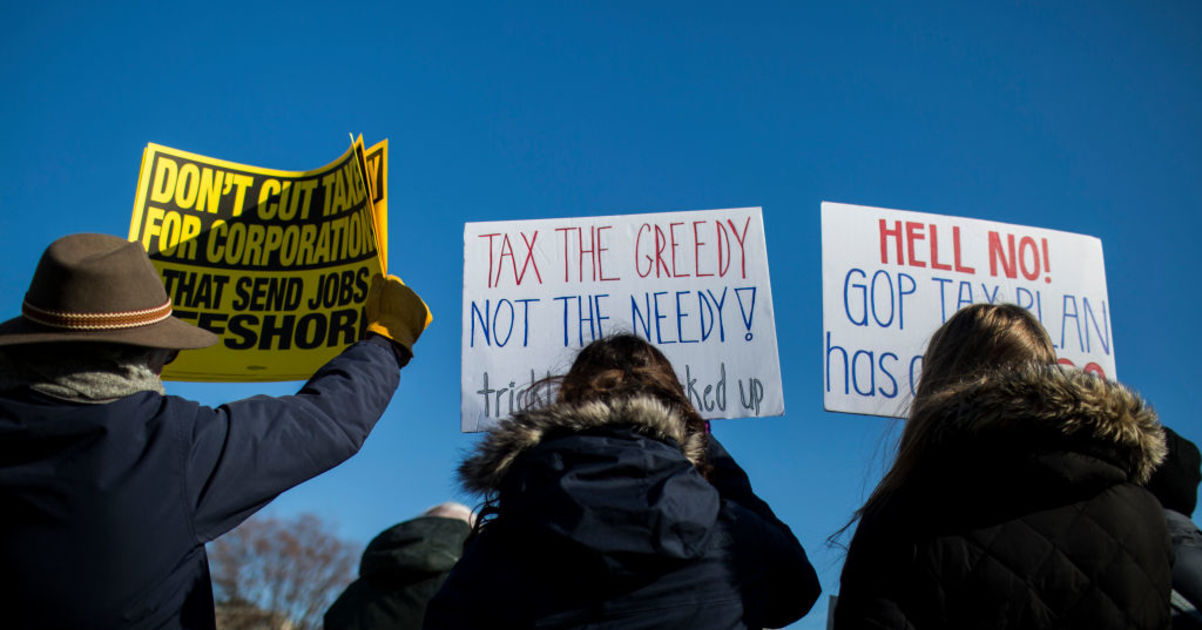Enjoy todaywe’re not going anywhere.
That’s the message LGBTQ leaders are sending to Republican lawmakers for passing a tax bill that undermines the Affordable Care Act and gives a break to corporations.
LGBTQ and HIV/ AIDS organizations roundly condemned the bill, which the House passed Wednesday, as distrous for LGBTQ health. And they said they’re ready for a fight.
“Congressional leadership may be cheering today, but Whoville has midterm elections in less than a year, and voters–including those living with HIVwill be looking to hold them accountable when it does,” says William McColl, AIDS United’s Vice President for Policy & Advocacy.
The bill repeals the ACA’s individual mandate which requires most enroll in an insurance plan. That move will increase insurance premiums by about 10 percent, according to the Congressional Budget Office. Advocates add that the deficit created by the bill will automatically result in devastating cuts programs disproportonately impacting LGBTQ people.
“If the Trump-Pence tax scam becomes law, programs crucial to the LGBTQ community like Medicare, Medicaid, global HIV/AIDS programs, and the Ryan White Care Act will surely face future efforts to cut their benefits,” says David Stacy, director of government affairs for the Human Right Campaign, in a statement.
But some groups are already looking ahead.
“Not on our watch,” Tyrone Hanley of the National Center for Lesbian Rights (NCLR) Policy Counsel tells INTO. “In solidarity with struggling LGBTQ people across the country, NCLR will fight alongside diverse movements to reject this war on the poor and middle class and our country’s values.”
Corinne Corinne Green, policy coordinator for the Transgender Law Center (TLC), said her organization is focused on section 1557 of the ACA, better known as nondiscrimination protections. The ACA currently prohibits anti-trans discrimination and denial of care. Transgender advocates anticipate that the Trump administration is taking aim that those next year.
“We’re focused on informing people that that’s happening, that that’s a possibility, that that’s coming down the pipeline,” Green tells INTO, adding that LGBTQ need to be fighting now to keep those protections.
“They should be calling their representatives,” she says. “I know folks are tired of hearing that. But they should be calling their congresspeople.”
Anti-LGBTQ lawmakers may also be facing another kind of pressure come midterm elections. Elliot Imse, Director of Communications for the Victory Fund, says more than 150 LGBTQ candidates will be on ballots across the country in 2018.
“In 2018, we expect more LGBTQ people to run for congress than ever before,” he says. “We have the potential to double our representation the House of Representatives and to double our representation in the U.S. Senate.”
Doubling representation in the Senate won’t be hard. Wisconsin Senator Tammy Baldwin remains the only out senator and The Victory Fund hopes to change that by electing Kyrsten Sinema to the Senate in Arizona.
LGBTQ lawmakers, Imse argues, not only advance equality but protect the community. In times like these, he said, that matters.
The tax bill does have at least one bright spot for LGBTQ families: On the chopping block was the adoption tax credit. In an unexpected turn, LGBTQ organizations joined with a coalition of 150 groups, including pro-life and Evangelical organizations, to save it.
“The engagement of the LGBT community on this issue along with the other diverse groups I think really put us over the top and I think saved the credit because we were told this was over,” says Chuck Johnson, President and CEO of the National Council for Adoption.
LGBTQ families, he says, would have been hard-hit by the loss of the credit, which totals $13,840 for 2018.
Of course, not everyone is ready for a fight.
Desert AIDS Project (DAP) in Palm Springs, California asked their clients and supporters ahead of the tax bill vote to call their legislators. Now that it’s passed, they’re focused on continuing their day-to-day work advocating for LGBTQs.
“Everyone is going to be talking about fighting and the election,” says Jack Bunting, public relations specialist. “But we at Desert AIDS Project are going to be doing what we’ve been doing for the last 30 years, and we are going to be taking care of those most vulnerable in our community.”
Bunting notes that DAP has approximately 4,000 clients. If ACA were repealed, more than half of them would lose coverage. “But,” he says, “we would find ways to keep taking care of them.”
Image via Getty
Don't forget to share:
Help make sure LGBTQ+ stories are being told...
We can't rely on mainstream media to tell our stories. That's why we don't lock our articles behind a paywall. Will you support our mission with a contribution today?
Cancel anytime · Proudly LGBTQ+ owned and operated
Read More in Impact
The Latest on INTO
Subscribe to get a twice-weekly dose of queer news, updates, and insights from the INTO team.
in Your Inbox













